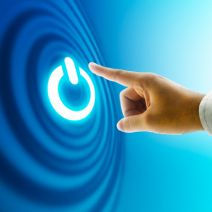-
SMART Blog

-
Jerry Fetty

- 4,238,983 Records Compromised So Far in 2014… and Counting
SMART Blog
Tip of the Week: On or Off, Which is Better For Your PC at the End of the Day?
 After a long, hard day at the office, you might be tempted to just log off of your workstation without also shutting down your PC to save time the next day. But should you power down your desktop, or simply log off? Both have their own pros and cons,
After a long, hard day at the office, you might be tempted to just log off of your workstation without also shutting down your PC to save time the next day. But should you power down your desktop, or simply log off? Both have their own pros and cons,
The first question to answer is how often do you use the machine? The workload of a PC varies by user, but for the sake of this article, we’re going to address the typical computing needs of the normal office worker: PCs that are used Monday through Friday, 40 hours a week.
Reality check: believe it or not, some people are under the assumption that turning a computer on and off can damage the equipment. As it turns out, this is no longer the case. Early PCs caused power surges when powering on, which was bad for the components. However, it’s perfectly safe to shut down your computer and turn it back on when you need to use it.
Power consumption is another factor that needs to be considered. If you’re keen on saving as much energy as possible to lower your electric bill, then it’s a pretty good idea to power down your PC when you’re finished with it. However, if you want to use your PC bright and early the morning after, you can put it into sleep mode (akin to Standby or Hibernate modes) before leaving the office. Doing this instead of turning your PC off uses a miniscule amount of energy, less than the traditional light bulb.
Another factor that needs to be considered is your geographical location. Is your location prone to natural disasters that lead to blackouts? If so, you should power down your machine at the end of the day. Power inconsistencies can mess with your IT infrastructure. This is why many businesses use an Uninterrupted Power Supply (UPS), which is designed to safely power down equipment without data loss or hardware failure in the event a sudden loss of power.
As explained by ComputerHope, turning off a PC is a good way to protect your PC from a sudden power-down, but it does nothing to prevent damage from a potential power surge.
A power surge destroys electrical devices regardless if it is on or off. Therefore, turning the computer off does not prevent this from occurring. The only way to prevent power surges is to unplug all power cables, phone cables, and network cables.
It’s also important that you consider your computer’s maintenance schedules. If your techs run a daily virus scan at night, then you won’t have to worry about the scan interfering with work that's performed during the day. If you’re currently taking advantage of managed IT services, like those offered by SMART Services, you’ll want to leave your desktop powered on so that we can remotely administer maintenance and patches, run scans, and so on. Powering down the machine prevents us from doing our job, so do us a favor and leave it powered on, but in sleep mode.
About the author
Jerry Fetty is the CEO and founder of SMART I.T. Services, Inc. Jerry has been called the "Geek King". He has been helping companies make smart decisions about their networks and automation systems for over 30 years.



Comments